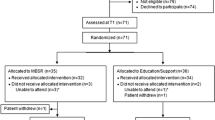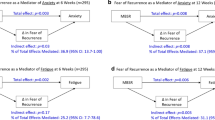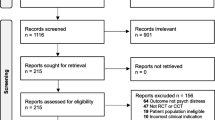Abstract
Emotional distress is common during chemotherapy, and supportive interventions during this time are often required. Mindfulness-based interventions appear promising amongst cancer survivors, but scant research has been conducted amongst patients undergoing acute treatment. This trial compared the efficacy of a brief mindfulness-based intervention (bMBT) with relaxation therapy on reducing distress amongst chemotherapy patients. Sixty-eight people receiving first-line chemotherapy at Auckland City Hospital were randomised to bMBT (n = 32) or relaxation training groups (n = 36). In both conditions, participants attended three 90-min weekly sessions. Overall distress (distress thermometer (DT); impact thermometer (IT)), cancer-related stress (Impact Events Scale–Cancer (IES-C)), cancer symptom distress (Memorial Symptom Assessment Scale–Short Form (MSAS-SF)) and social avoidance (SA) were assessed at enrolment, post-intervention and at 3-month follow-up. Both groups reported reductions in overall and cancer-related stress over time. Immediately post-intervention, however, bMBT (but not relaxation training) participants reported increased symptom distress, marginally increased social avoidance and decreased quality of life. So whilst overall distress and cancer distress declined in both groups, the mindfulness intervention was associated with increased symptom distress and social avoidance and reduced quality of life. This report presents a randomised controlled trial of a mindfulness-based intervention during chemotherapy and suggests that care is needed in employing mindfulness-based interventions in acute health treatment contexts.



Similar content being viewed by others
References
Andrykowski, M. A., & Manne, S. L. (2006). Are psychological interventions effective and accepted by cancer patients? I. Standards and levels of evidence. Annals of Behavioral Medicine, 32(2), 93–97.
Baer, R. A., Smith, G. T., Hopkins, J., Krietemeyer, J., & Toney, L. (2006). Using self-report assessment methods to explore facets of mindfulness. Assessment, 13(1), 27–45. doi:10.1177/1073191105283504.
Baer, R. A., Smith, G. T., Lykins, E., Button, D., Krietemeyer, J., Sauer, S., et al. (2008). Construct validity of the Five Facet Mindfulness Questionnaire in meditating and nonmeditating samples. Assessment, 15(3), 329–342. doi:10.1177/1073191107313003.
Baken, D. M. L., & Woolley, C. (2011). Validation of the distress thermometer, impact thermometer and combinations of these in screening for distress. Psycho-Oncology, 20(6), 609–614. doi:10.1002/pon.1934.
Bartley, T. (2012). Mindfulness-based cognitive therapy for cancer. Oxford: Wiley-Blackwell.
Berghmans, C., Godard, R., Joly, J., Tarquinio, C., & Cuny, P. (2012). Effects of the mindfulness based stress reduction (MBSR) approach on psychic health (stress, anxiety, depression) and coping mode of diabetic patients: a controlled and randomized pilot study. Annales Medico-Psychologiques, 170(5), 312–317. doi:10.1016/j.amp.2010.08.010.
Bränström, R., Kvillemo, P., Brandberg, Y., & Moskowitz, J. T. (2010). Self-report mindfulness as a mediator of psychological well-being in a stress reduction intervention for cancer patients—a randomized study. Annals of Behavioral Medicine, 39(2), 151–161. doi:10.1007/s12160-010-9168-6.
Brotto, L. A., Erskine, Y., Carey, M., Ehlen, T., Finalyson, S., Heywood, M., et al. (2012). A brief mindfulness-based cognitive behavioral intervention improves sexual functioning versus wait-list control in women treated for gynecologic cancer. Gynecologic Oncology, 125(2), 320–325. doi:10.1016/j.ygyno.2012.01.035.
Brucker, P. S., Yost, K., Cashy, J., Webster, K., & Cella, D. (2005). General population and cancer patient norms for the Functional Assessment of Cancer Therapy–General (FACT-G). Evaluation and the Health Professions, 28(2), 192–211. doi:10.1177/0163278705275341.
Carlson, L. E., & Garland, S. N. (2005). Impact of mindfulness-based stress reduction (MBSR) on sleep, mood, stress and fatigue symptoms in cancer outpatients. International Journal of Behavioral Medicine, 12(4), 278–285. doi:10.1207/s15327558ijbm1204_9.
Carlson, L. E., & Speca, M. (2010). Mindfulness-based cancer recovery: a step-by-step MBSR approach to help you cope with treatment and reclaim your life. Oakland: New Harbinger Publications.
Carlson, L. E., Angen, M., Cullum, J., Goodey, E., Koopmans, J., Lamont, L., et al. (2004). High levels of untreated distress and fatigue in cancer patients. British Journal of Cancer, 90(12), 2297–2304.
Carlson, L. E., Doll, R., Stephen, J., Faris, P., Tamagawa, R., Drysdale, E., & Speca, M. (2013). Randomized controlled trial of mindfulness-based cancer recovery versus supportive expressive group therapy for distressed survivors of breast cancer (MINDSET). Journal of Clinical Oncology, 31(25), 3119–3126.
Carmody, J., & Baer, R. A. (2009). How long does a mindfulness-based stress reduction program need to be? A review of class contact hours and effect sizes for psychological distress. Journal of Clinical Psychology, 65(6), 627–638.
Cella, D. F., Tulsky, D. S., Gray, G., Sarafian, B., Linn, E., Bonomi, A., et al. (1993). The functional assessment of cancer therapy scale: development and validation of the general measure. Journal of Clinical Oncology, 11(3), 570–579.
Chang, V. T., Hwang, S. S., Feuerman, M., Kasimis, B. S., & Thaler, H. T. (2000). The Memorial Symptom Assessment Scale–Short Form (MSAS-SF). Cancer, 89(5), 1162–1171.
Chiesa, A., & Serretti, A. (2011). Mindfulness-based interventions for chronic pain: a systematic review of the evidence. The Journal of Alternative and Complementary Medicine, 17(1), 83–93.
Davis, M., Eshelman, E. R., & McKay, M. (2008). The relaxation and stress reduction workbook. Oakland: New Harbinger Publications.
Dobkin, P. L., Irving, J. A., & Amar, S. (2012). For whom may participation in a mindfulness-based stress reduction program be contraindicated? Mindfulness, 3(1), 44–50.
Donovan, K. A., Grassi, L., McGinty, H. L., & Jacobsen, P. B. (2014). Validation of the distress thermometer worldwide: state of the science. Psycho-Oncology, 23(3), 241–250. doi:10.1002/pon.3430.
Eakin, E. G., & Strycker, L. A. (2001). Awareness and barriers to use of cancer support and information resources by HMO patients with breast, prostate, or colon cancer: patient and provider perspectives. Psycho-Oncology, 10(2), 103–113. doi:10.1002/pon.500.
Epstein, M. D., & Lieff, J. D. (1981). Psychiatric complications of meditation practice. Journal of Transpersonal Psychology, 13(2), 137–147.
Foley, E., Baillie, A., Huxter, M., Price, M., & Sinclair, E. (2010). Mindfulness-based cognitive therapy for individuals whose lives have been affected by cancer: a randomized controlled trial. Journal of Consulting and Clinical Psychology, 78(1), 72–79.
Germer, C. K., & Neff, K. D. (2013). Self-compassion in clinical practice. Journal of Clinical Psychology, 69(8), 856–867.
Hayes, A. M., & Feldman, G. (2004). Clarifying the construct of mindfulness in the context of emotion regulation and the process of change in therapy. Clinical Psychology: Science and Practice, 11(3), 255–262. doi:10.1093/clipsy.bph080.
Henry, D. H., Viswanathan, H. N., Elkin, E. P., Traina, S., Wade, S., & Cella, D. (2008). Symptoms and treatment burden associated with cancer treatment: results from a cross-sectional national survey in the U.S. Supportive Care in Cancer, 16(7), 791–801. doi:10.1007/s00520-007-0380-2.
Higgins, S. C., Montgomery, G. H., & Bovbjerg, D. H. (2007). Distress before chemotherapy predicts delayed but not acute nausea. Supportive Care in Cancer, 15(2), 171–177. doi:10.1007/s00520-006-0113-y.
Higgins, S. C., Montgomery, G. H., Raptis, G., & Bovbjerg, D. H. (2008). Effect of pretreatment distress on daily fatigue after chemotherapy for breast cancer. Journal of Oncology Practice, 4(2), 59–63.
Hohneker, J., Shah-Mehta, S., & Brandt, P. S. (2011). Perspectives on adherence and persistence with oral medications for cancer treatment. Journal of Oncology Practice, 7(1), 65–67.
Huijbers, M. J., Spinhoven, P., Spijker, J., Ruhé, H. G., van Schaik, D. J. F., van Oppen, P., et al. (2016). Discontinuation of antidepressant medication after mindfulness-based cognitive therapy for recurrent depression: randomised controlled non-inferiority trial. The British Journal of Psychiatry, 208(4), 366–373. doi:10.1192/bjp.bp.115.168971.
Iconomou, G., Mega, V., Koutras, A., Iconomou, A. V., & Kalofonos, H. P. (2004). Prospective assessment of emotional distress, cognitive function, and quality of life in patients with cancer treated with chemotherapy. Cancer, 101(2), 404–411. doi:10.1002/cncr.20385.
Jain, S., Shapiro, S. L., Swanick, S., Roesch, S. C., Mills, P. J., Bell, I., & Schwartz, G. E. R. (2007). A randomized controlled trial of mindfulness meditation versus relaxation training: effects on distress, positive states of mind, rumination, and distraction. Annals of Behavioral Medicine, 33(1), 11–21. doi:10.1207/s15324796abm3301_2.
Kabat-Zinn, J. (1990). Full catastrophe living: using the wisdom of your body and mind to face stress, pain, and illness. New York: Delta.
Klatt, M. D., Buckworth, J., & Malarkey, W. B. (2008). Effects of low-dose mindfulness-based stress reduction (MBSR-ld) on working adults. Health Education and Behavior, published online May 9.
Kuijpers, H. J. H., van der Heijden, F. M. M. A., Tuinier, S., & Verhoeven, W. M. A. (2007). Meditation-induced psychosis. Psychopathology, 40(6), 461–464.
Kuyken, W., Hayes, R., Barrett, B., Byng, R., Dalgleish, T., Kessler, D., et al. (2015). Effectiveness and cost-effectiveness of mindfulness-based cognitive therapy compared with maintenance antidepressant treatment in the prevention of depressive relapse or recurrence (PREVENT): a randomised controlled trial. The Lancet, 386(9988), 63–73. doi:10.1016/S0140-6736(14)62222-4.
Labelle, L. E., Campbell, T. S., Faris, P., & Carlson, L. E. (2015). Mediators of mindfulness-based stress reduction (MBSR): assessing the timing and sequence of change in cancer patients. Journal of Clinical Psychology, 71(1), 21–40. doi:10.1002/jclp.22117.
Larouche, S., & Edgar, L. (2004). The measure of distress: a practical thermometer for outpatient screening. Oncology Exchange, 3(3), 34–39.
Lehrer, P., & Carrington, P. (2003). Progressive relaxation, autogenic training and meditation. In D. Moss (Ed.), Handbook of mind-body medicine for primary care (pp. 137–149). Thousand Oaks: Sage Publications.
Lotfi-Jam, K., Carey, M., Jefford, M., Schofield, P., Charleson, C., & Aranda, S. (2008). Nonpharmacologic strategies for managing common chemotherapy adverse effects: a systematic review. Journal of Clinical Oncology, 26(34), 5618–5629.
Luborsky, L., Singer, B., & Luborsky, L. (1975). Comparative studies of psychotherapies: is it true that “everyone has won and all must have prizes”? Archives of General Psychiatry, 32(8), 995–1008. doi:10.1001/archpsyc.1975.01760260059004.
Luckett, T., King, M. T., Butow, P. N., Oguchi, M., Rankin, N., Price, M. A., et al. (2011). Choosing between the EORTC QLQ-C30 and FACT-G for measuring health-related quality of life in cancer clinical research: issues, evidence and recommendations. Annals of Oncology, 22(10), 2179–2190.
Luebbert, K., Dahme, B., & Hasenbring, M. (2001). The effectiveness of relaxation training in reducing treatment-related symptoms and improving emotional adjustment in acute non-surgical cancer treatment: a meta-analytical review. Psycho-Oncology, 10(6), 490–502. doi:10.1002/pon.537.
Lustyk, M. K., Chawla, N., Nolan, R. S., & Marlatt, G. A. (2009). Mindfulness meditation research: issues of participant screening, safety procedures, and researcher training. Advances in Mind-Body Medicine, 24(1), 20–30.
Ma, S. H., & Teasdale, J. D. (2004). Mindfulness-based cognitive therapy for depression: replication and exploration of differential relapse prevention effects. Journal of Consulting and Clinical Psychology, 72(1), 31–40.
Manne, S., Badr, H., Zaider, T., Nelson, C., & Kissane, D. (2010). Cancer-related communication, relationship intimacy, and psychological distress among couples coping with localized prostate cancer. Journal of Cancer Survivorship, 4(1), 74–85. doi:10.1007/s11764-009-0109-y.
Moyers, B. (1993). Meditate!... for stress reduction, inner peace... or whatever! Psychology Today, 26, 36–43.
National Comprehensive Cancer Network. (2003). Distress management. Clinical practice guidelines. Journal of the National Comprehensive Cancer Network: JNCCN, 1(3), 344.
Rawl, S. M., Given, B. A., Given, C. W., Champion, V. L., Kozachik, S. L., Barton, D., … Williams, S. D. (2002). Intervention to improve psychological functioning for newly diagnosed patients with cancer. Paper presented at the Oncology Nursing Forum.
Rosenbaum, E., & Kabat-Zinn, J. (2007). Here for now: living well with cancer through mindfulness: Satya House Pub.
Segal, Z. V., Williams, J. M. G., & Teasdale, J. D. (2002). Mindfulness-based cognitive therapy for depression: a new approach to preventing relapse. New York: Guilford Press.
Shennan, C., Payne, S., & Fenlon, D. (2011). What is the evidence for the use of mindfulness-based interventions in cancer care? A review. Psycho-Oncology, 20(7), 681–697. doi:10.1002/pon.1819.
Speca, M., Carlson, L. E., Goodey, E., & Angen, M. (2000). A randomized, wait-list controlled clinical trial: the effect of a mindfulness meditation-based stress reduction program on mood and symptoms of stress in cancer outpatients. Psychosomatic Medicine, 62(5), 613–622.
Stanton, A. L. (2006). Psychosocial concerns and interventions for cancer survivors. Journal of Clinical Oncology, 24(32), 5132–5137. doi:10.1200/jco.2006.06.8775.
Strauss, C., Cavanagh, K., Oliver, A., & Pettman, D. (2014). Mindfulness-based interventions for people diagnosed with a current episode of an anxiety or depressive disorder: a meta-analysis of randomised controlled trials. PloS One, 9(4), e96110.
Tacon, A. M., McComb, J., Caldera, Y., & Randolph, P. (2003). Mindfulness meditation, anxiety reduction, and heart disease: a pilot study. Family and Community Health, 26(1), 25–33.
Thewes, B., Meiser, B., & Hickie, I. B. (2001). Psychometric properties of the impact of event scale amongst women at increased risk for hereditary breast cancer. Psycho-Oncology, 10(6), 459–468. doi:10.1002/pon.533.
Veehof, M., ten Klooster, P., Taal, E., Westerhof, G., & Bohlmeijer, E. (2011). Psychometric properties of the Dutch Five Facet Mindfulness Questionnaire (FFMQ) in patients with fibromyalgia. Clinical Rheumatology, 30(8), 1045–1054. doi:10.1007/s10067-011-1690-9.
Weiss, D. (2007). The impact of event scale: revised. In J. P. Wilson & C. S. Tang (Eds.), Cross-cultural assessment of psychological trauma and PTSD (pp. 219–238). New York: Springer.
Wells, A. (2005). Detached mindfulness in cognitive therapy: a metacognitive analysis and ten techniques. Journal of Rational-Emotive and Cognitive-Behavior Therapy, 23(4), 337–355. doi:10.1007/s10942-005-0018-6.
Wilson, B. M., Mickes, L., Stolarz-Fantino, S., Evrard, M., & Fantino, E. (2015). Increased false-memory susceptibility after mindfulness meditation. Psychological Science, 26(10), 1567–1573. doi:10.1177/0956797615593705.
Yoo, H. J., Ahn, S. H., Kim, S. B., Kim, W. K., & Han, O. S. (2005). Efficacy of progressive muscle relaxation training and guided imagery in reducing chemotherapy side effects in patients with breast cancer and in improving their quality of life. Supportive Care in Cancer, 13(10), 826–833. doi:10.1007/s00520-005-0806-7.
Acknowledgements
This research could not have been conducted without funding from the Oakley Mental Health Foundation, the generosity of our participants and support of the Medical Oncology Department, Auckland City Hospital, the Regional Cancer and Blood Service, and the Auckland Division of the Cancer Society. We also thank Clinical Psychologist, Sue Dykes, for her mindfulness expertise and Natalie Tuck, Kate Loveys and Katie Simpson for their research assistance.
Author’s Contributions
LR designed and executed the study, delivered interventions, analysed the data and wrote the paper. IB collaborated with the study design, analyses and editing of manuscript. DB collaborated with the study design, recruitment of participants and editing of the manuscript. NC supervised the design and execution of the study, analyses of data and collaborated in writing paper.
Author information
Authors and Affiliations
Corresponding author
Additional information
Clinical Trial Number: Australian New Zealand Clinical Trials Registry ACTRN12613000238774.
Rights and permissions
About this article
Cite this article
Reynolds, L.M., Bissett, I.P., Porter, D. et al. A Brief Mindfulness Intervention Is Associated with Negative Outcomes in a Randomised Controlled Trial Among Chemotherapy Patients. Mindfulness 8, 1291–1303 (2017). https://doi.org/10.1007/s12671-017-0705-2
Published:
Issue Date:
DOI: https://doi.org/10.1007/s12671-017-0705-2




